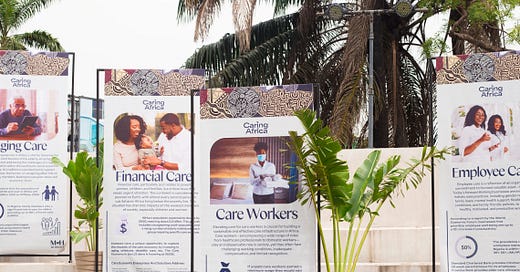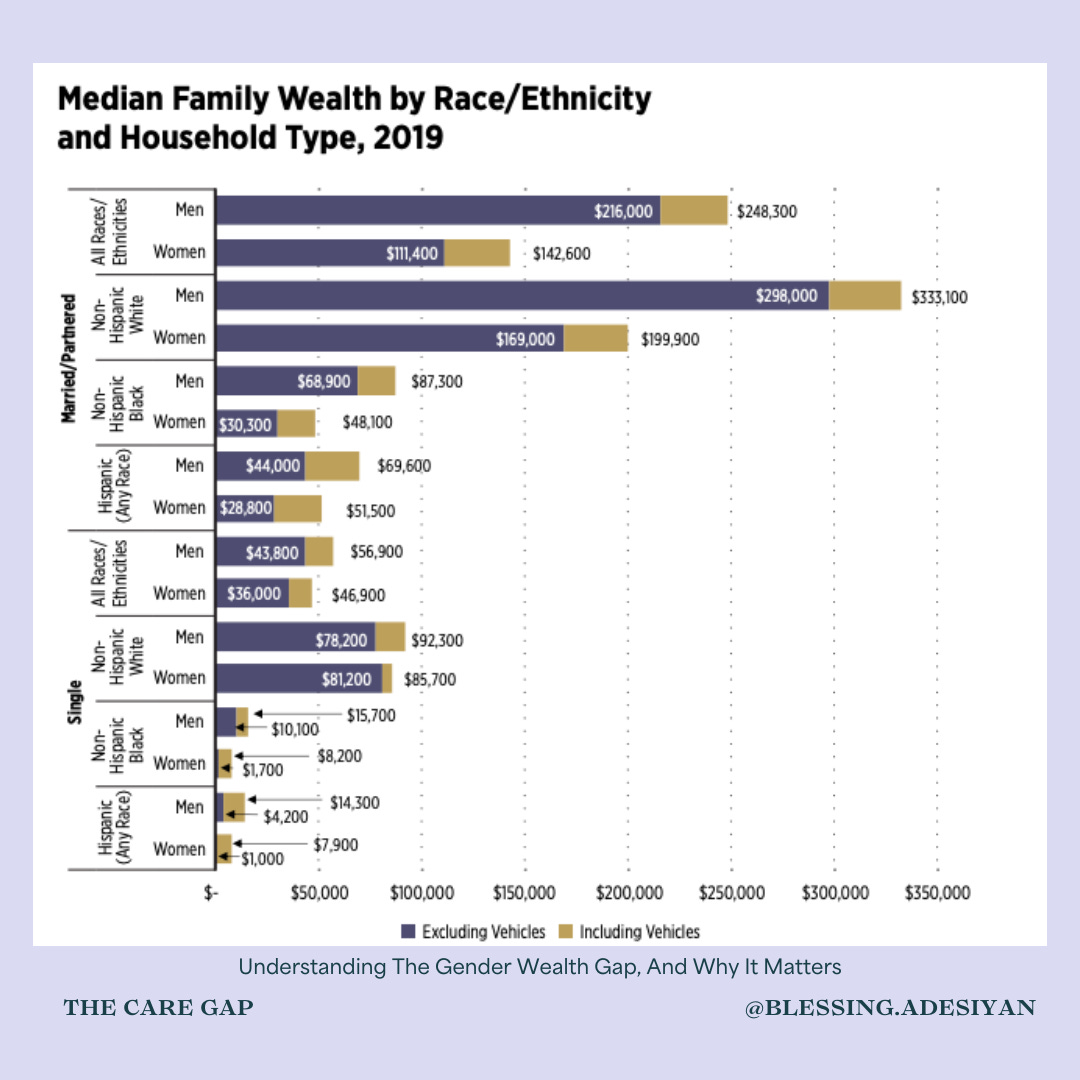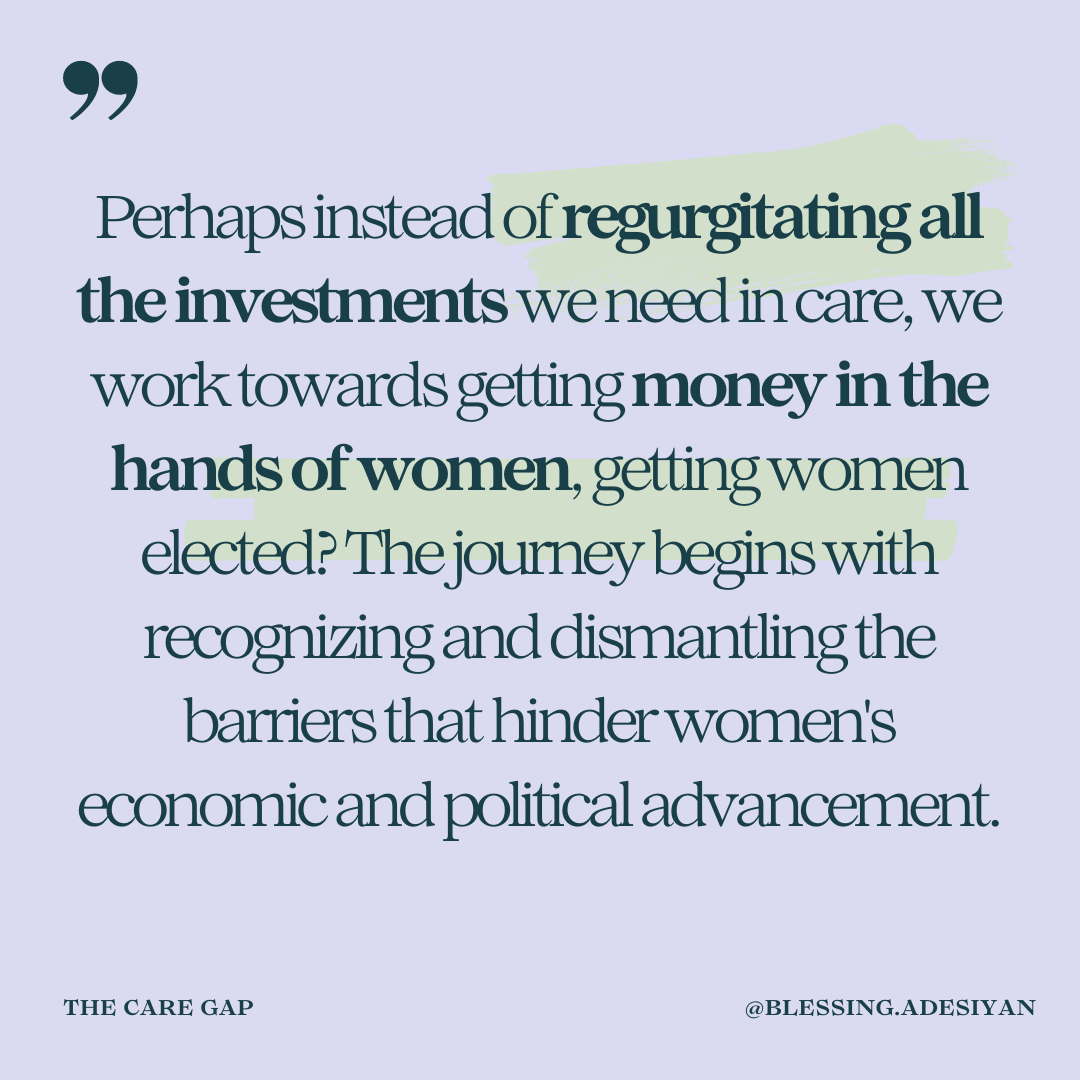Women Need Economic & Political Power To Close The Gender Care Gap
these issues are deep and interwoven
Reflecting on the recent Caring Africa Summit, the unveiling of our Care Museum was a profound moment for me, capturing the vast spectrum of care from childcare, aging care, and care workers, to climate care. It highlighted an undeniable truth: the intricate web of care that underpins our societies is deeply interwoven with the lives and well-being of women, who are both the primary caregivers and the most affected by gaps in our care infrastructure. I had carefully picked the panel sessions to address the need for private and public partnerships, investments, valuing care workers and providers, elevating care for children, aging adults, persons with disability and more. And as the panel progressed, we discussed much of what we all already knew, that care requires money and it requires caring policies, areas where women lack representation.
Yet, this Women's Month, we find ourselves at a critical juncture. The evolving global landscape, marked by demographic shifts, climate change, and technological advancements, underscores the urgency to reimagine and reinvest in care. The reality is that we will achieve nothing without power. The market that desperately needs care infrastructure to access wellbeing and participate in the economy are women, and the other side of the market that provides care and desperately needs access to fair wages, dignity and respect are also women. Per my MBA class, women globally have a weak bargaining power and will achieve nothing without money and political power.
Empowering women economically and politically isn't just an act of rectifying injustice; it's a strategic imperative for societal progress. When women have access to money, they not only uplift their immediate families but also invest back into their communities, fostering growth and resilience. Similarly, increased political power for women ensures that policies and decisions are more inclusive, addressing the nuanced needs of the care economy and those it serves.
So, how do we move forward? Perhaps instead of regurgitating all the investments we need in care, we work towards getting money in the hands of women, getting women elected? The journey begins with recognizing and dismantling the barriers that hinder women's economic and political advancement. From advocating for policies that ensure equal pay and access to financial services for women to supporting women's leadership and representation in political arenas, the path is multifaceted.
We must also champion grassroots movements that have successfully influenced care-related policies. These movements, often led by women who have firsthand experience with the challenges and opportunities within the care economy, provide valuable blueprints for change. Their success stories serve as a testament to the power of collective action and the potential for such efforts to effect transformation on a global scale.
Financial Power: Do you know that the gender wealth gap is considerably larger than the gender wage gap? Women may earn 78% of what men earn, but they own only 36% as much wealth. Closing the wealth gap for women is pivotal. It not only elevates our status within our communities and families but also enables us to make choices that can lead to the betterment of care services. When women control financial resources, they are more likely to invest in their children's education, health, and overall well-being, creating a multiplier effect that benefits the broader society. However, barriers such as wage gaps, limited access to credit, and the disproportionate burden of unpaid care work hinder women's financial empowerment. Women of color face the greatest obastacles to building financial power on all fronts.
Political Power: Women's representation in political spaces is equally crucial. Policy decisions impact the structure and funding of the care economy, and when women have a seat at the table, these policies are more likely to reflect the realities and needs of those who provide and rely on care. Moreover, women in political positions can advocate for systemic changes that recognize, reduce, and redistribute care work, such as implementing family-friendly workplace policies, ensuring fair compensation for care workers, and investing in public care services. However, progress has been slow and uncertain, reminding us that strong challenges to women’s political equality remain.
Our call to action is clear: support initiatives that amplify women's economic and political voices. Whether it's through advocating for gender-responsive budgeting, backing women-led enterprises, or promoting equitable participation in governance, every step taken is a stride towards a more inclusive and caring society.
To close the care gap, initiatives at multiple levels are necessary:
Economic Policies: Implement policies that promote equal pay for equal work, provide financial support to caregivers, and ensure women's access to financial services and entrepreneurship opportunities.
Education and Training: Invest in education and professional development for women to break the cycle of poverty and empower them to pursue careers, including those in the care sector.
Political Representation: Support movements and policies that increase women's participation in political processes and decision-making bodies at all levels.
Social Norms: Challenge and change societal norms that devalue care work and create barriers to women's economic and political participation.
Community and International Support: Build coalitions and networks that support women's financial and political empowerment at the community level and through international cooperation.
In solidarity, we must all—regardless of gender—recognize the intrinsic value of care and commit to a future where the care economy is no longer an afterthought but a cornerstone of our societal framework. It is only through collective acknowledgment and action that we can truly elevate the care economy, ensuring it receives the recognition, investment, and support it rightfully deserves.
Global Care Memo:
All workers should be able to earn time off:
The federal government should guarantee it. Betsey Stevenson proposes making “earned time off” part of a modernization of the Fair Labor Standards Act.
93% of women are stressed about money:
Building a cash reserve can help, experts say. Largely as a result of the wealth gap, women tend to be more financially vulnerable than their male counterparts.
Cash for Nannies, Extra Days Off:
Child-Care Perks Top Workplace Benefits: More than half of US companies said they are prioritizing child-care benefits in 2024
The strong labor force participation of women workers and the strength of the economy are intertwined.
Paid Family Caregivers in Indiana Face Steep Cutbacks
Now that federal pandemic-era funds are shrinking, states like Indiana are ending or curtailing programs that finance home care by relatives of seriously ill children and adults.
With more men choosing to stay at home with their kids, the stigma — and the notion that they’re just filling in for mom — could finally be fading.
Why Does the School Day End Two Hours Before the Workday?
This mismatch creates a child-care crisis between 3 and 5 p.m. that has parents scrambling for options.
Jeremy Hunt: Free childcare plan on track but no guarantees
Jeremy Hunt has insisted the government is "on track" to deliver a planned expansion of free childcare in April. However, the chancellor told the BBC he could not give "an absolute guarantee" that the places needed would all be available in time.
The Care Gap is written by Blessing Adesiyan, Founder & CEO of MH WorkLife and Executive Director, Caring Africa where she is on a mission to close the care gap for women, workplaces, and economies. Follow @blessing.adesiyan @mhworklife @caringafrica for more.






